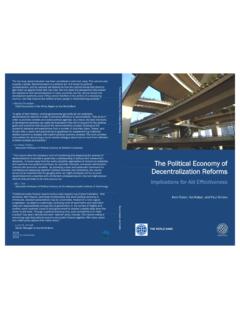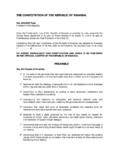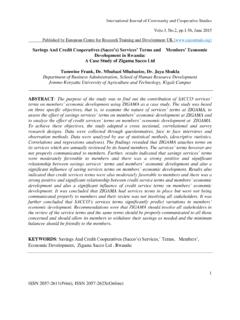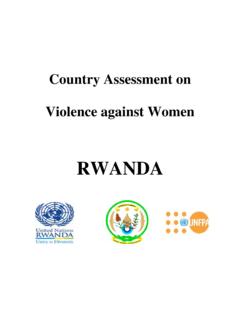Transcription of Education in Rwanda - World Bank
1 A World BANK COUNTRY STUDYE ducation in RwandaRebalancing Resources to Accelerate Post-Conflict Development and Poverty ReductionTHE World BANKW ashington, 22-09-2003 19:46 Page iCopyright 2004 The International Bank for Reconstruction and Development / The World Bank1818 H Street, Washington, 20433, All rights reserved Manufactured in the United States of America First printing: October 2003printed on recycled paper1 2 3 4 05 04 03 World Bank Country Studies are among the many reports originally prepared for internal use aspart of the continuing analysis by the Bank of the economic and related conditions of its develop-ing member countries and to facilitate its dialogues with the governments.
2 Some of the reports arepublished in this series with the least possible delay for the use of governments, and the academic,business, financial, and development communities. The typescript of this paper therefore has notbeen prepared in accordance with the procedures appropriate to journal printed texts, and theWorld Bank accepts no responsibility for errors. Some sources cited in this paper may be informaldocuments that are not readily findings, interpretations, and conclusions expressed in this paper are entirely those of theauthor(s) and do not necessarily reflect the views of the Board of Executive Directors of the WorldBank or the governments they represent. The World Bank cannot guarantee the accuracy of thedata included in this work.
3 The boundaries, colors, denominations, and other information shownon any map in this work do not imply on the part of the World Bank any judgment of the legalstatus of any territory or the endorsement or acceptance of such boundaries. The material in this publication is copyrighted. The World Bank encourages dissemination of itswork and normally will grant permission for use. Permission to photocopy items for internal or personal use, for the internal or personal use ofspecific clients, or for educational classroom use, is granted by the World Bank, provided that theappropriate fee is paid. Please contact the Copyright Clearance Center before photocopying Clearance Center, Rosewood DriveDanvers, MA 01923, : 978-750-8400 Fax: permission to reprint individual articles or chapters, please fax your request with completeinformation to the Republication Department, Copyright Clearance Center, fax 978-750-4470.
4 All other queries on rights and licenses should be addressed to the World Bank at the addressabove, or faxed to 202-522-2422. ISBN: 0-8213-5610-0eISBN: 0-8213-5611-9 ISSN: 0253-2123 Library of Congress Cataloging-in-Publication DataEducation in Rwanda : rebalancing resources to accelerate post-conflict development andpoverty cm. -- (A World Bank country study)Summary in bibliographical 0-8213-5610-01. Education -- Rwanda . 2. Education -- Rwanda --Statistics. I. World Bank. II. 2003370 .967571--dc212003057688 Rwanda_FM 22-09-2003 19:46 Page iiiiiTABLE OFCONTENTSF oreword, by Romain Murenzi ..xiForeword, by Birger Fredriksen ..xiiiAbstract ..xvAcknowledgments ..xviiAbbreviations, Acronyms, and Data Notes.
5 XixExecutive Summary ..1R sume Analytique ..9 Chapter 1. Rwanda : Demography, Economy, and the Government Budget ..19 The Demographic Context .. 21 Macroeconomic Conditions .. 24 Overall Patterns of Government Finance .. 26 Public Spending on Education .. 27 Conclusion .. 29 Chapter 2. Enrollment Trends and Patterns of Student Flow ..31 Aggregate Enrollments by Level of Education .. 31 Trends in Educational Coverage .. 34 From Cross-Sectional Indicators of Coverage to Student Flow Patterns .. 37 Student Flow Patterns in Primary Schooling .. 38 Student Flow Patterns in Secondary Schooling .. 47 Policy Perspectives on Management of Student Flow.
6 49 Conclusion .. 53 Chapter 3. Education Finance ..55 National Spending on Education .. 55A Closer Look at Public Spending on Education .. 59 Public Spending per Student .. 66 Policy Implications .. 71 Conclusion .. 73 Chapter 4. Socioeconomic Disparities in Education ..75 Overview of Participation Rates .. 76 Educational Participation Rates among Orphans .. 79 Disparities in Student Flow Patterns .. 81 Distribution of Public Spending on Education .. 85 Policy Implications .. 88 Conclusion .. 89 Chapter 5. Service Delivery in Primary Education ..91 Overview of the Supply of Services .. 91 Teacher Allocation across Schools .. 96 Rwanda_FM 22-09-2003 19:46 Page iiiEconomies of Scale in Service Delivery.
7 100 Student Learning .. 103 Policy Implications and Conclusion .. 108 Chapter 6. Service Delivery in Secondary Education ..111 Overview of the Supply of Services .. 112 Teacher Qualifications, Utilization, and Deployment .. 118 Economies of Scale in Service Delivery .. 124 Examination Results and Their Correlates .. 128 Policy Implications .. 131 Conclusion .. 132 Chapter 7. Higher Education ..135 Structure of the System .. 136 Study Abroad on Government Scholarships .. 143 Staffing Patterns in Public and Private Institutions of Higher Education .. 147 Costs of Service Delivery and Student Finance .. 151 Student Flow Efficiency and Output of Graduates.
8 158 Policy Implications .. 161 Conclusion .. 164 Chapter 8. Education and the Labor Market ..165 Employment Structure, Educational Attainment of Workers, and Returns to Education .. 166 Output of Graduates and Their Absorption into the Workforce .. 170 Policy Implications .. 174 Conclusion .. 176 Statistical Appendix .. xxxReferences .. xxxTABLES1-1: Population Size, Rwanda , 1970 2002, and Poverty Rates and Selected Health Indicators, 1970 2000 .. 221-2: Orphans and Children Living apart from Biological Parents, Rwanda , circa 2000 .. 231-3: Economic Performance of Rwanda and Selected Countries, 1980 2000 .. 251-4: Government Revenue, Rwanda , 1981 2001.
9 261-5: Government Spending, Rwanda , 1981 2001 .. 281-6: Government Spending on Education , Rwanda , 1981 2001 .. 292-1: Gross Enrollment Ratios (GERs) by Level of Education , Rwanda , 1991 92 and 2000 01 .. 352-2: Coverage of the Education System in Rwanda and Selected Countries, Late 1990s 2000 .. 372-3: Percentage Entry Rate to Grade 1, Rwanda , 1991 92 and 2000 01 .. 392-4: Percentage Survival Rates in Primary Schooling, Rwanda , 1991 92 and 2000 01 .. 41 IVTABLE OFCONTENTSR wanda_FM 22-09-2003 19:46 Page iv2-5: Percentage Repetition Rates in Primary Schooling, Rwanda , 1990 91 and 2000 01 .. 432-6: Summary Indices of Student Flow Efficiency in Primary Schooling, Rwanda , 1990 91 and 2000 01.
10 442-7: Secondary School Transition and Survival Rates, Rwanda , 1991 92 and 2000 01 .. 472-8: Percentage Repetition Rates in Secondary Schooling, Rwanda , 1990 91 and 2000 01 .. 482-9: Summary Index of Student Flow Efficiency in Secondary Schooling, Rwanda , 1990 91 and 2000 01 .. 492-10: Distribution of Primary Schools and New First-Graders by Highest Grade of Instruction Offered by the School, Rwanda , 2000 01 .. 502-11: Grade-Specific Enrollments in Primary and Secondary Education , Rwanda , 2000 01 .. 513-1: Level and Distribution of Public Spending on Education , Rwanda , 1982 2001 .. 563-2: Current Public Spending on Education through the Ministry of Education and Other Ministries or Government Agencies, Rwanda , 1999 2001.
















